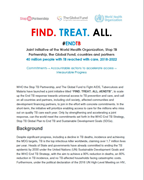WHO DG Flagship Initiative on ending TB

In advance of the 2023 UN High Level Meeting on TB, the World Health Organization (WHO) has expanded the scope of the WHO Director-General’s Flagship Initiative to fast-track progress towards ending TB, over the period 2023-2027. The focus of the initiative will be on ensuring universal access to prevention, care and the latest tools and technologies to combat TB on the road to Universal Health Coverage (UHC). This builds on the achievements made in the first period of the flagship initiative “FIND. TREAT. ALL. #ENDTB” since its launch in 2018, in collaboration with Stop TB Partnership, and The Global Fund. This special initiative will continue to bring together countries and stakeholders to redouble efforts and accelerate the TB response.
Background
TB remains one of the world’s deadliest infectious killers. 1.6 million people died from TB in 2021 and 10.6 million people fell ill with this preventable and curable disease. Global efforts to combat TB have saved an estimated 74 million lives since the year 2000. However, the COVID-19 pandemic, coupled with conflicts across Europe, Africa and the Middle East and socioeconomic inequities, has reversed years of progress made in the fight to end TB, and placed an even heavier burden on those affected, especially the most vulnerable. For the first time in over a decade, TB deaths and disease have increased. There is an urgent need to dramatically increase action and investments to ramp up the fight against TB and achieve commitments to end TB made by global leaders. This is vital to ensure no one is left behind in equitably accessing TB prevention and care in line with WHO’s drive towards achieving Universal Health Coverage. Achievements of the 2018-2022 DG Flagship Initiative- FIND. TREAT. ALL. #ENDTB In 2018, the DG Flagship Initiative was jointly launched with the Stop TB Partnership and the Global Fund titled “FIND. TREAT. ALL. #ENDTB”. The initiative called for actions to rapidly close gaps and scale up access to care. Targets were set as part of the initiative to reach 40 million people with TB with care, and at least 30 million people with TB preventive treatment between 2018 and 2022. The targets from the initiative were used as the foundation for the targets and commitments made by Heads of State in the political declaration of the 2018 UN High Level Meeting on TB. Since 2018, the initiative has provided a strong political platform to urge countries to prioritize efforts to end TB, including through setting of country-specific targets, increased investments and high-level advocacy through joint calls of the WHO DG and Civil Society and partners urging to provide access to TB services during COVID-19 pandemic, TB preventive treatment, accelerate uptake of new TB guidelines and campaigns such as “Race to End TB” in many high TB burden countries. The initiative contributed to the strengthening of partnerships with countries, partners, and civil society and to advancing multisectoral engagement and accountability. There has been progress made towards reaching the 2022 UN High Level Meeting targets, despite the impact of the COVID-19 pandemic. Since 2018, more than 30 million people were provided with life-saving TB treatment and more than 12.5 million provided with TB preventive treatment. Specialized technical assistance has been provided to more than 100 countries, including 49 countries with a high TB burden, in the uptake of new WHO guidelines and tools, such as for all-oral treatments, rapid molecular tests, that can significantly improve access, quality of care and better outcomes for those affected. Over 109 countries have been supported in uptake of the new WHO-recommended all-oral, shorter treatment for drug resistant TB. New effective drugs for TB treatment are available due to the WHO leadership and effective collaboration with Member States, partners, such as Stop TB Partnership, Global Fund, UNITAID, manufacturers and civil society. A high-level spotlight was placed on ending TB through regular High-Level Events with WHO leadership engagement, including at the UN General Assembly, the World Health Assembly, and other opportunities.
Given the positive impact of the 2018 flagship initiative at the global and national levels and based on advice from WHO’s Strategic and Technical Advisory Group, the scope of the flagship initiative has been expanded for 2023-2027, covering the second term of WHO’s Director General and fully aligned with the WHO priorities for this period.
Funding
2.3 billion US dollars per year needed to fill resource gap for implementing existing TB interventions.
Yet currently, concrete actions and investments on the ground to reach these targets and fulfil these commitments are falling far short. Without a concerted global movement to increase coverage of TB services (public, private and community-based), as well as accelerate research for TB, at the current trends of decline in incidence, it will take humanity 130 years to end TB.
WHO DG Flagship Initiative to #ENDTB


